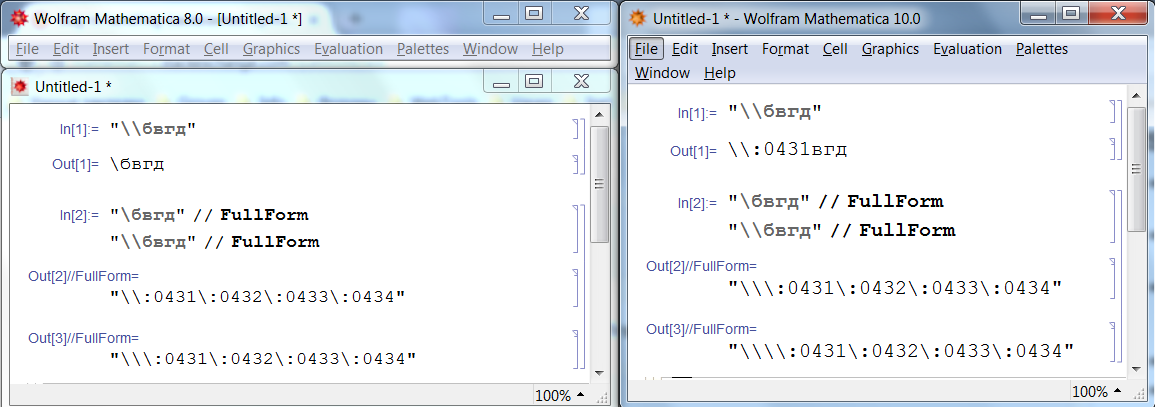Bug introduced in 10.0.0 and fixed in 10.1
UPDATE: Now both the inputs "\б" and "\\б" are interpreted as "\\б" and displayed in OutputForm as "\б", InputForm["\б"] returns "\\б" and StringLength["\\б"] returns 2.
Consider:
"\бвгд" // FullForm
"\\бвгд" // FullForm
In v.8.0.4 I get this:
"\\:0431\:0432\:0433\:0434" "\\\:0431\:0432\:0433\:0434"
But v.10.0.0 adds redundant backslash before the first backslashed Cyrillic symbol:
"\\\:0431\:0432\:0433\:0434" "\\\\:0431\:0432\:0433\:0434"
As the result it is not possible to open any file which name (or name of a directory in the path) starts from a Cyrillic symbol.
Also after evaluating the above (in the case the Cyrillic symbols were typed, not pasted in the Notebook) the following bugs appear:
When I try to cut by pressing
Ctrl+XanyCellor group of cells in this Notebook I get http://demonstrations.wolfram.com/ opened in my browser and nothing changed in the FrontEndAfter some additional editing (entering backslashed Cyrillic symbols after the quote
"but without entering the closing quote and without evaluation of the cell) an attempt to cut an input cell by pressingCtrl+Xresults in commenting all the code in the selected input cell. PressingCtrl+Xagain uncomments the code.
All the above manipulations with Ctrl+X give this result when English keyboard locale is selected.
Does anyone also observe this? Is there a workaround?
P.S. OS Win7 x64.


Import["алексей\попков","Text"]>привет!$\endgroup$Importis to useFileNameJoin. $\endgroup$"\\:0431\:0432\:0433\:0434"is properly formed -- that is, I think the bug is in V8.0.4 (and V9.0.1, too). If I paste the string in V8.0.4 and execute it, the output displays as nine characters,\:0431вгд, which seems the proper interpretation (compare withStringLength["\бвгд"]). A similar thing happens with other unicode characters. That it used to work suggests offsetting bugs or intentional flexibility in processing resource-locator strings. Similarly, the V10 string"\\\\:0431\:0432\:0433\:0434"seems to be missing a backslash. $\endgroup$FileNameJoinanyway, or do you mean it's not working? (Btw, I don't have Windows, so I can only check the filename string in Mma; I can't check whether the file can be opened with the string.) $\endgroup$